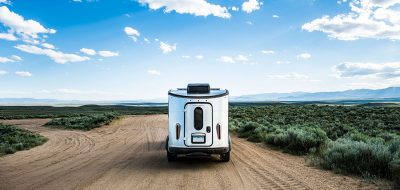Fuel prices have returned back to Earth (at least for the time being), but the simple fact is that we are all still feeling the crunch of the slow economy. People can’t afford to trade up to a new coach or trailer every few years like the might have done previously, so now we’re getting more and more people who want to know how they can make their RV last longer.
Like any vehicle, a big part of that answer is regular maintenance. My philosophy is “grease and fluids are cheaper than parts and labor.” Change the oil and filter about every 5,000 miles or every season, whichever comes first. Manufacturer’s recommendations vary, of course, but changing the oil at the beginning of each season is a good idea even if the coach was not driven many miles. Condensation and contaminants can collect in the crankcase when a vehicle sits for several months. Which reminds me, unless you can’t get to your coach for some reason, it’s a good idea to start and run it once or twice a month to keep everything well lubricated. The same goes for the generator-its biggest enemy is lack of use, so make sure you start and run it under load at least once a month until travel season begins.
As many of you have probably already read, I’m a big advocate of synthetic oils in every place you can use them-engine, transmission, even power steering. Yes, they’re more expensive, but they provide better protection and last longer, too. They don’t actually wear out like ordinary petroleum-based oils do-they just get dirty. Using a good filtration system like Amsoil’s new Ea oil filters with full synthetic nanofiber technology or even a remote oil filtration system can help you get the most out of your oil and greatly extend time between oil changes. Don’t forget to have the lube points checked once a year, and if you haven’t had the coolant system flushed in a couple of years, you might want to do that, too. While you’re at it, check the belts and hoses for signs of cracking. Today’s products are so good and reliable that we tend to forget about them, but if the serpentine belt breaks or a coolant hose fails, your trip is done for a day, at least.
Of course, there’s more to keeping your RV new than just the mechanicals. The exterior should be thoroughly washed and waxed at the beginning and end of every travel season to prevent those dreaded black streaks from penetrating the gel coat. And depending on where you live, the interior may require attention to keep it looking factory fresh. In places like Arizona, block all the windows to keep sun from fading upholstery and carpet (cardboard cut-outs work fine), and we’ve even heard of some RVers that keep a bucket of water inside to stop fabrics from drying out and becoming brittle. Up in the Pacific Northwest, we use dehumidifiers like Drizaire, which pull water vapor out of the air and deposit it into a small cup that can be drained periodically. If you don’t, mold, mildew and ill-fitting wooden cabinet doors can be the result. Excess moisture causes the wood to swell, and without a dehumidifier, you might come back to find that none of your cabinet doors open or shut properly anymore. The bad news is, they don’t necessarily return to their normal shape when the weather dries out again.
An RV is an investment second only to your home. Proper maintenance and storage will help you get the most from your coach for many years to come. Have questions about your RV? Have your own tips for longer RV life? Let me know…I’d love to hear from you. Have a wonderful holiday!


Anonymous
Synthetic lubricants deliver wear protection, engine cleanliness and fuel efficiency conventional oils simply can’t match. A small investment with big benefits. Synthetic lubricants are chemically engineered to form pure lubricants. They contain no contaminants or molecules that don’t serve a designed purpose. Their versatility and pure, uniform molecular structures impart properties that provide better friction-reduction, optimum fuel efficiency, maximum film strength and extreme-temperature performance.
Pingback: Propecia
Pingback: dissertation and thesis writing
Philip Eastman
ROBERT: Great infor. I am also an Amsoil dealer with several dealers. You are so correct about the greatness of synthetic oils and filters. I use FULL synthetic in mt Cummins Diesel with dual by pass filters. I change oil at 30,000 miles ( based on an oil analysis) and by pass filetrs at 60,000 miles. As you can see I do not have to crawl under the RV bou once a year. Keep the news comming. Phil 374250
KEN PERRY
I am going to assume the question pertains to the wheel bearings and would reccomend a service yearly and around 12-15k if the mileage is greater than that during the year.
Bruces
How often should the wheels on a 5er be greased?
Robert
Thank you gentleman for the interesting comments. If you run a quality sythetic oil you certainly can change your intervals. I run one of my personal vehicles on Amsoil 0-30 oil. It is a a gas vehicle with 160,000 miles. Runs, steers and handles better than new. I change the oil at 10,000 miles and the filter at 5,000 in between.
Amsoil recommends that you change your oil once per year regardless of filtration if you do not have an oil anaysis done annually. . The reason is because potential contamination from antifreeze, fuel dilution or other sources. Another potential problem is break down of the paper filter element in your block filter.
A proper oil analysis gives you a complete break down of everything in your oli and will let you know whether it is safe to run any longer. With the use of a by-pass filter you may be able to run the same oil for 50,000 miles or more. Don’t forget you will be adding some new oil to the system each time you change one of your filters.
Speaking of filters Amsoil has stepped up to the plate and really done a nice job with the nano fiber technology. Better air filtration without the messy oil.
Happy Thanksgiving & God Bless you, Robert
mr_whit
Hi Robert, I have been useing AMSOIL from 1973 and am a dealer. I changed all my fluids in my 2006, dodge 4X4, 3500, pulling 35′ 5th wheel–oil change is 1 time a year at 17,000 miles with useing the AMSOIL filters. I increased my fuel mileage +7mpg…, looking at a by-pass filter for the oil. I did an oil analizs, and still have more lub-factor that new regular oil. Thanks for spreading the word and AMSOIL is made in the USA.
Useing reg oil or 100%synthetics, the seals will dry out if not moved.
Lynn E. Holland
Robert, I agree with your oil change recommendations for gasand always followed them with my gas engines, but do I really need to change my dp oil and filter every 5k or 1 yr period? There were no service manuals when I bought my rig a year ago (98 Safari Sahara, 300 hp C6), but I was under the impression that I was good for 10,000-15,000 miles between changes. I drive mainly in CA, am never out in below freezing weather.
Also, when you say “start and run it once or twice a month”, I assume you mean to DRIVE IT, not just idle it. I have been told it is better to let it sit if you can’t get everything up to operating temp, including tires, with a run on the highway.
Thanks for all the great information you give us!
Lynn E. Holland
98 Safari Sahara